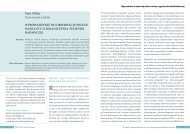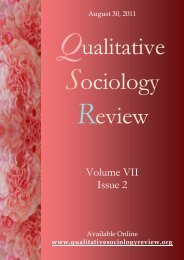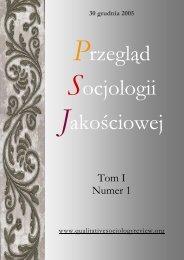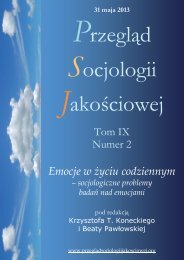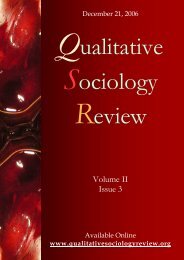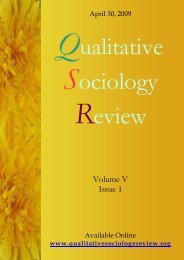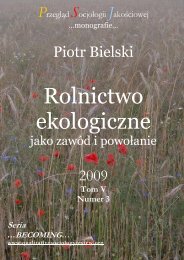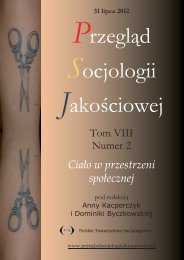Gillies, V. and Edwards, R. - Qualitative Sociology Review
Gillies, V. and Edwards, R. - Qualitative Sociology Review
Gillies, V. and Edwards, R. - Qualitative Sociology Review
Create successful ePaper yourself
Turn your PDF publications into a flip-book with our unique Google optimized e-Paper software.
discounted rate. Furthermore, when financial difficulty forced a close friend to return<br />
to work after having a baby, Fiona helped out with childminding for an agreed low<br />
fee. This is in marked contrast to other working class mothers in our sample (like<br />
Denise <strong>and</strong> Julie) who provided or relied upon free, regular childcare <strong>and</strong> other kinds<br />
of support. In a study of informal exchange in households, Colin Williams <strong>and</strong> Jan<br />
Windebank (2002) found working class families were considerably more likely to rely<br />
on unpaid mutual aid. As they note, such favours generate an undefined obligation to<br />
be met in the unspecified future, whereas a cash exchange can effectively remove<br />
this hanging social debt. For the Ryders, placing financial value on particular forms of<br />
support removed the discomfort of this uncertainty <strong>and</strong> the sense of obligation<br />
associated with reciprocal relationships.<br />
The example of the Ryder family also demonstrates the extent to which<br />
economic capital is crucial in managing <strong>and</strong> mediating social capital. Aside from<br />
enabling them to buy a house in a prosperous area <strong>and</strong> live among well-educated<br />
professionals, Colin’s income removes them from the kind of social interdependency<br />
experienced by many of the poorer families in our sample. However, while economic<br />
capital underpins the appropriation of social capital, cultural capital represents an<br />
equally significant factor, particularly with regard to parenting practices. Parents in<br />
our sample with access to middle class resources (such as money, high status social<br />
contacts <strong>and</strong> legitimated cultural knowledge) drew on these capitals to consolidate<br />
their power <strong>and</strong> advantage, <strong>and</strong> invested heavily in their children’s education as a<br />
method of transferring this privilege. Previous research has produced similar findings,<br />
with Patricia Allatt (1993) illustrating how the minutiae of middle class parenting<br />
practice is founded on an active manipulation of social <strong>and</strong> financial resources to<br />
ensure advantage is passed down through the generations. Inge Bates (2002) has<br />
also explored the dynamics of social <strong>and</strong> cultural capital transmission within families,<br />
highlighting the complex struggles of parents to ensure middle class benefits are<br />
Reflecting their middle class cultural capital, the Ryders hold strong values around<br />
education. Colin has been educated to university degree level, while Fiona attended<br />
a grammar school ix <strong>and</strong> has A levels x <strong>and</strong> secretarial qualifications. Both are keen to<br />
see their daughter do well at school <strong>and</strong> are heavily involved with Amber’s homework<br />
projects. An 11 plus exam xi still operates in the Ryder’s school catchment area <strong>and</strong><br />
although Amber is viewed as being on course to pass, Colin is monitoring her work<br />
<strong>and</strong> says he will employ a tutor if necessary to ensure she makes it to the local<br />
grammar school. The relatively loose social capital networks accessed by the Ryders<br />
are particularly well suited to securing Amber’s educational advantage in that they<br />
contain a number of education professionals, including Amber’s own teachers.<br />
Unusually there is no Parent Teachers Association at Amber’s school, but Fiona’s<br />
weekly visits to the school to hear other children read have enabled her to develop<br />
useful contacts <strong>and</strong> access relevant information. Social capital in this context is<br />
particularly well appreciated given the anxiety the Ryders express about Amber’s<br />
forthcoming transfer to secondary school xii , as is evident in the following extract from<br />
the interview with Colin:<br />
We know other parents that are going through it <strong>and</strong> the whole system<br />
seems to be fraught in that er, there’s pressure about choice, it’s er, not<br />
really choice at all. You can try <strong>and</strong> choose but if you don’t get into the first<br />
school that you want the likelihood is that the second school down won’t<br />
have you because they’re not at the top of your list, so it’s a nightmare<br />
situation … Obviously I’d be pretty concerned about the results. If she<br />
doesn’t pass [the 11+] ... I’m not too sure what the alternatives are but<br />
they’re not - there are some good secondary schools but then again where<br />
do you put them on your list to make sure you get in? ... You can try <strong>and</strong> go<br />
©2006 QSR Volume II Issue 2 www.qualitativesociologyreview.org 54



